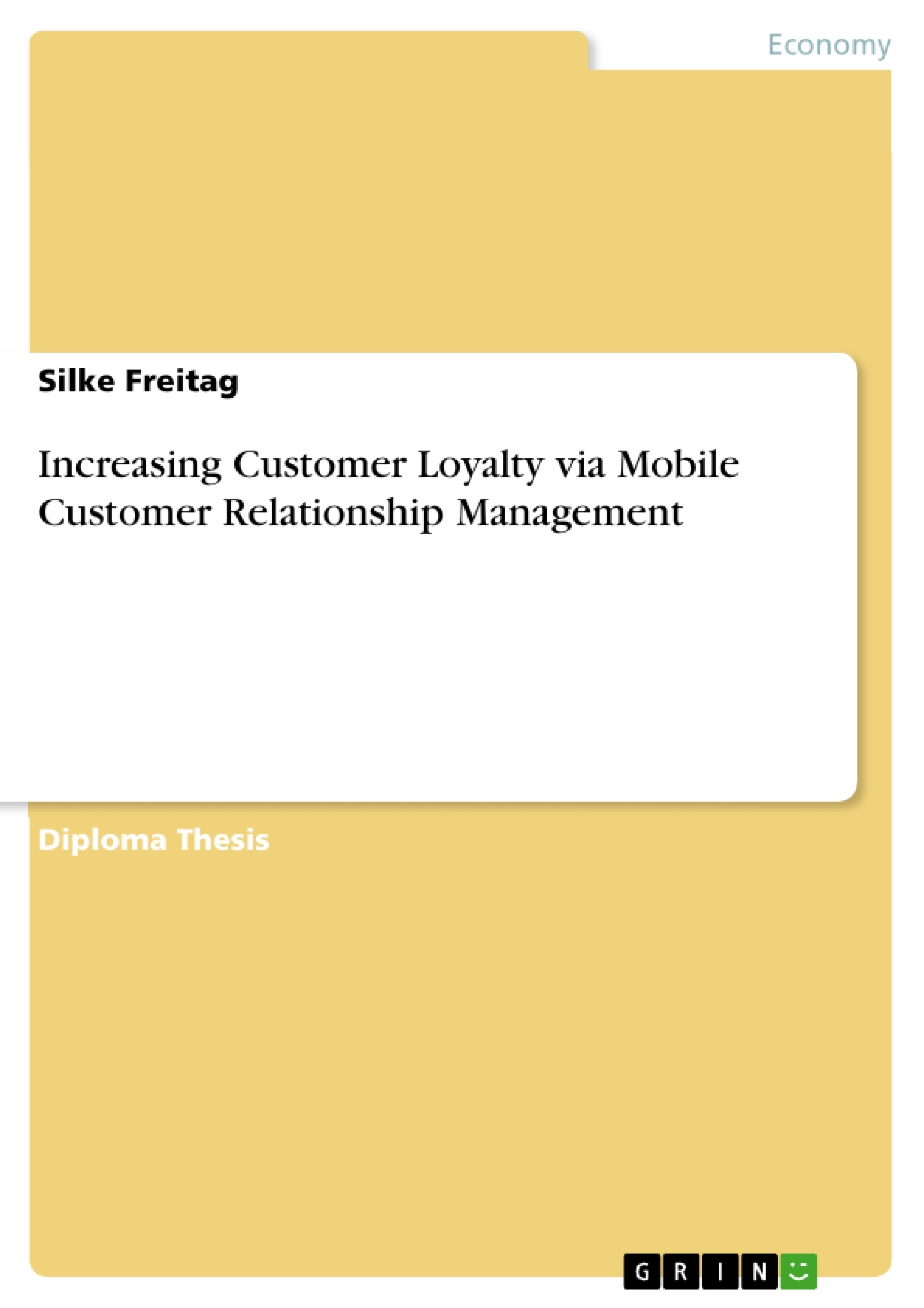In times of computerization and mass consumption, one vital element has long been left behind. So far the customer rather tended to be treated as a trash dump for all those mailings that completely missed his interest, while he actually longed for companies to guess his needs, requirements and wishes and send him personalized offers especially tailored to those. With the beginning of the new century, technological advances and innovations in the field of data mining and data management have already made this dream come true for many customers. This new way of building relationships is called Customer Relationship Management (CRM) and comprises all aspects of interaction a company has with its customers. “It’s a business strategy that aims to understand, anticipate and manage the need’s of a company’s current and potential customers.”1 Along with the fast proliferation of mobile devices, consumer’s behavior has changed considerably. Customers do no longer constraint their activities to one communication channel, but take advantage of new technological opportunities such as mobile commerce. In this fast-moving technological environment creating and intensifying customer loyalty has become indispensable for the business world. This change in consumers’ behavior gave way to the development of mobile CRM solutions enabling companies to serve every customer individually at any time and anywhere and create services and offers specifically corresponding to their needs. With every mobile phone user being able to send and receive short messages, wireless marketing offers great potential in the field of Customer Relationship Management. Nevertheless, if the Short Message Service (SMS) is applied to send offers and advertisements it should be an end-to-end service2. Customers are to be given the opportunity to directly respond to an offer and finish the transaction over their phone. This requires secure mobile payment solutions. Just recently, the German subsidiary of the international Mobile Market Association has been founded in Munich while Hewlett Packard, Lucent, Oracle, Siemens and Sun Microssystems have formed a consortium to standardize mobile payment an foster mobile business.3
Inhaltsverzeichnis (Table of Contents)
- Introduction
- Problem statement
- Limitation of research topic
- Research procedure
- M-Business: "Anywhere Anytime Access"
- Definition of M-Business
- Mobile network technology
- GSM
- GPRS
- HSCSD
- UMTS
- Service technology
- WAP
- Bluetooth
- Short Messaging Service (SMS)
- iMode as an alternative to WAP
- Mobile payment solutions
- Paybox
- Mobilpay
- Payitmobile solution
- Mobile Customer Relationship Management – Key Functions and Definitions
- Definition of Customer Relationship Management
- CRM - A customer-oriented organizational process
- Benefit of CRM
- Improvement of image
- Improvement of efficiency
- Acquisition of new customers
- Customer bonding
- Customer Lifetime Value - A means to measure the success of CRM
- Fields of application
- Objectives of Mobile Customer Relationship Management
- M-CRM as a means to increase customer loyalty
- What is the meaning of customer loyalty?
- Mobile Services: What do customers expect?
- Survey: "What do you think about Mobile Marketing?”
- Analysis
- Comment
- The "EMF" principle
- Advantages of M-CRM for the customer and the provider
- SMS-Advertising under the aspect of Permission Marketing
- Permission Marketing: License to advertise
- SMS: a two-way medium
- Loyalty-based SMS operations
- Push services or pull services?
- Personalized messaging
- Location Based Services
- Value adding services
- Worldwide SMS traffic
- SMS Couponing – Example of a mobile business model
- Future prospects for mobile customer relationships
- Possible future mobile business fields
- Multi-media messaging
- Market forecast
- FAQ's
Zielsetzung und Themenschwerpunkte (Objectives and Key Themes)
The diploma thesis focuses on the utilization of mobile customer relationship management (M-CRM) to enhance customer loyalty. The study explores the potential of mobile technologies, specifically SMS, to foster customer relationships and ultimately drive business growth.- The evolving landscape of M-Business and its impact on customer interactions.
- The definition and application of CRM principles in a mobile context.
- Exploring the effectiveness of SMS as a tool for permission-based marketing and customer engagement.
- The role of customer loyalty in the mobile marketing environment.
- Examining the future of mobile CRM and its potential to shape customer relationships.
Zusammenfassung der Kapitel (Chapter Summaries)
The introduction sets the stage for the research by defining the problem statement and outlining the scope of the study. It explores the emerging field of mobile business and its potential to revolutionize customer interactions.
Chapter 2 delves into the world of M-Business, providing an overview of mobile network technologies, service technologies like WAP, and mobile payment solutions. This chapter establishes the technological foundation for mobile CRM.
Chapter 3 defines the concept of CRM and its application in the mobile realm. It examines the benefits of CRM, including image improvement, efficiency gains, and customer acquisition, and introduces the Customer Lifetime Value metric as a means to measure CRM success.
Chapter 4 delves into the core theme of the thesis: utilizing M-CRM to increase customer loyalty. It explores the meaning of customer loyalty in the mobile context, examines customer expectations regarding mobile services through a survey, and outlines the "EMF" principle, emphasizing the importance of ease, speed, and user-friendliness.
Chapter 5 focuses on SMS advertising and its role in permission marketing. It examines SMS as a two-way medium, exploring different loyalty-based SMS operations and the growing worldwide SMS traffic. The chapter concludes with an example of a mobile business model using SMS couponing.
Schlüsselwörter (Keywords)
The thesis explores the intersection of customer relationship management, mobile technologies, customer loyalty, and permission-based marketing, specifically SMS advertising. Key concepts examined include M-Business, M-CRM, customer lifetime value, SMS-based marketing strategies, and the future prospects of mobile CRM.- Citation du texte
- Silke Freitag (Auteur), 2002, Increasing Customer Loyalty via Mobile Customer Relationship Management, Munich, GRIN Verlag, https://www.grin.com/document/185776



